
You’ve probably noticed a trend on social media where it seems ok to fat shame people. As a society we have come to view overweight people as greedy and lazy because if you’re overweight, it’s totally your fault, right?
Wrong! For a start, major corporations spend millions of dollars researching how to get us hooked on their products by targeting different areas of the brain and our chemical responses to various ingredients. As I’ve written about before (link) there are so many factors that contribute to weight, such as genetics, illness, culture, hormone imbalance, socio-economic status, education, psychological and emotional distress and more. The last 2 in particular can be some of the hardest to combat, with many people experiencing food addiction due to finding comfort in eating.
Like any addiction, it’s not as simple as “just stop doing it”. It’s an ADDICTION!
I’m wondering how many people have considered that food addiction maybe be even harder to break than drugs or alcohol?
I know that may be hard to accept, but hear me out. Drug addicts struggle to give up drugs, they crave them, they use them as a form of escape, but they don’t physically need them to survive. They won’t die without them, though it may sometimes feel that way to them. The same applies to alcoholics. Yet people who are addicted to food are faced with the stone cold fact that the very thing they are addicted to is essential to their existence. They will literally die without it! They are faced with their addiction every single day! It’s not illegal or restricted, it’s advertised freely.
One of the biggest tools for recovery is for addicts to remove themselves from situations or people that may encourage them to relapse, so how is a food addict supposed to utilise this integral step? Is there any hope for recovery?
Firstly, I’d like to let you know that if this is an area you’re struggling with, you’re not alone. You shouldn’t feel ashamed if you don’t seem to make any progress. We all need help with things sometimes and it’s ok not to know how to do everything yourself. So, how can you make changes?
• Identify the problem. With emotional eating, one of the best things you can do is acknowledge that this is your trigger. Once you have identified this, it will empower you to take ownership and slowly start to make changes. If you know what causes you to reach for comfort food, it makes it easier to put steps into place to combat that.
• Seek help. Doing things can be a real struggle. Often we become disheartened, lose motivation or simply can’t find what works for us. A good nutritionist will be able to help you identify problematic patterns, help you find feasible alternatives, prescribe supplements (that may be linked to your cravings) and provide you with support and encouragement along the way. Finding a counsellor or psychologist may help you identify and work through any psychological issues attached to your eating patterns, as well as providing you with added support.
• Join a program. There are many programs out there which are designed to help you lose weight without having to sign up for fancy shakes, products or gym memberships. One that I really love is the Eat Fat Get Fit Program (https://www.facebook.com/NaomiFersteraEatFatGetFit/ ), which I am actively part of and have seen many people achieve great results. The program is designed to provide you with nutritional information based on solid science, meal plans, Q and A, exercise plans, interaction and support from other members, support from a Nutritionist, Exercise Physiologist, Dietitian and Personal Trainer who all want you to succeed! One of the things I love most about this program is the private Facebook group where the members can talk abut anything, because there’s no such thing as a stupid question. People are so great at encouraging each other and sharing information, that it’s a super positive community to be a part of.
• Spring clean. Some people find that a really effective way to discourage poor eating habits is to simply not stock the fridge or pantry with the usual junk food culprits. Go through the fridge and pantry and ditch all the convenience foods. Often we will think twice if we have to make a special trip to the shop for a treat, with a junk being a less appealing choice if the only options in the house are healthier or something we have to prepare.
• Restock. I’m the last person in the world to say no to chocolate! Treats and enjoyment of food are a wonderful thing, so to discourage bingeing, replace your treats with healthier options. Buy chocolate with a higher cacao content, as it will have less sugar. Switch out sweets for frozen berries, ice-cream for frozen natural yoghurt, and crisps for seed crackers and hummus.
• Community. One of the biggest struggles with addiction is feeling isolated, misunderstood and unsupported. Joining groups of like minded people can provide a safe place to talk about your struggles, receive support, share ideas, discuss what has or hasn’t worked for you, share encouragement and motivation. There are many groups for this type of thing both in the community and online. They will all have a slightly different approach, so explore your options and see what gels with you.
• Take the First Step. While getting the courage up to try again can be the hardest thing, you won’t make any progress if you don’t take the first step.
• Believe in yourself. You CAN do this! You may make mistakes along the way and struggle to keep going, but you CAN make changes, you CAN break the cycle and you CAN change your relationship with food.
Together, let’s change the attitude around body shaming and encourage people instead, as you never know what they may be struggling with.
